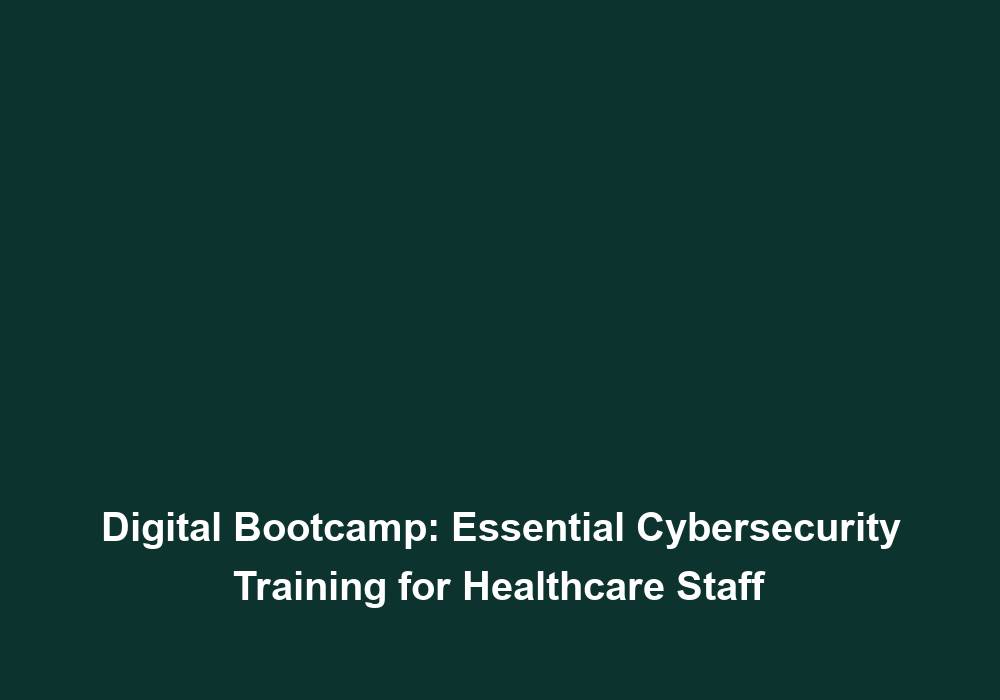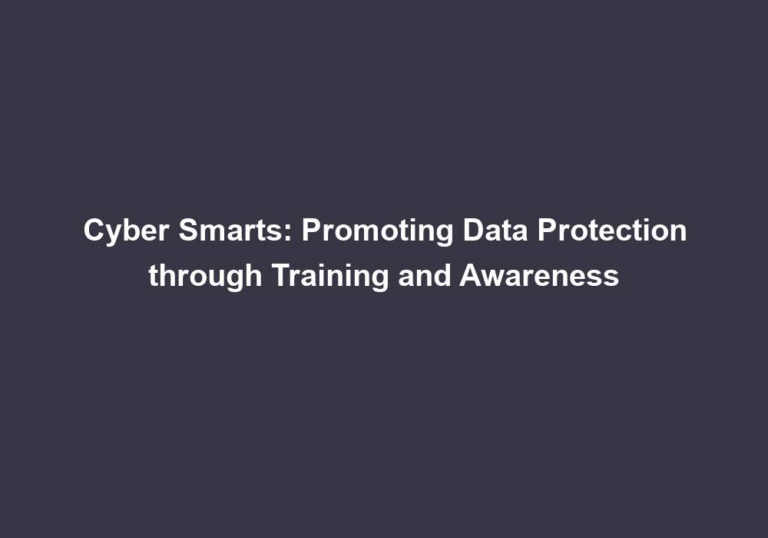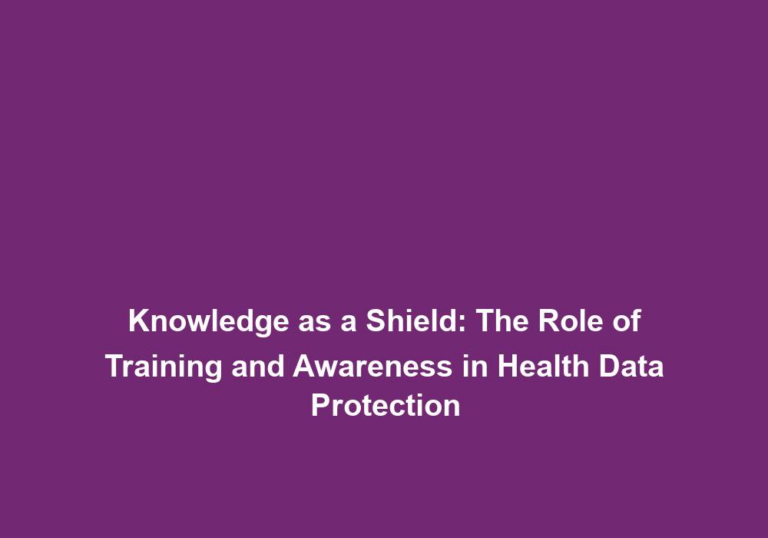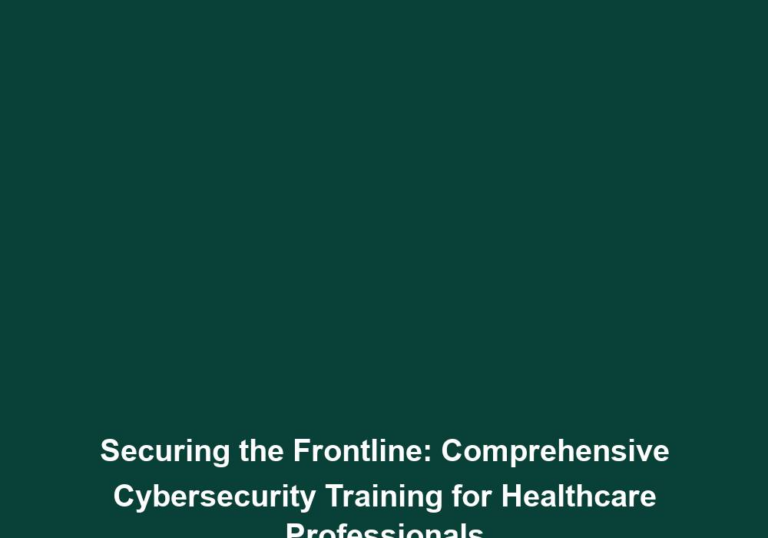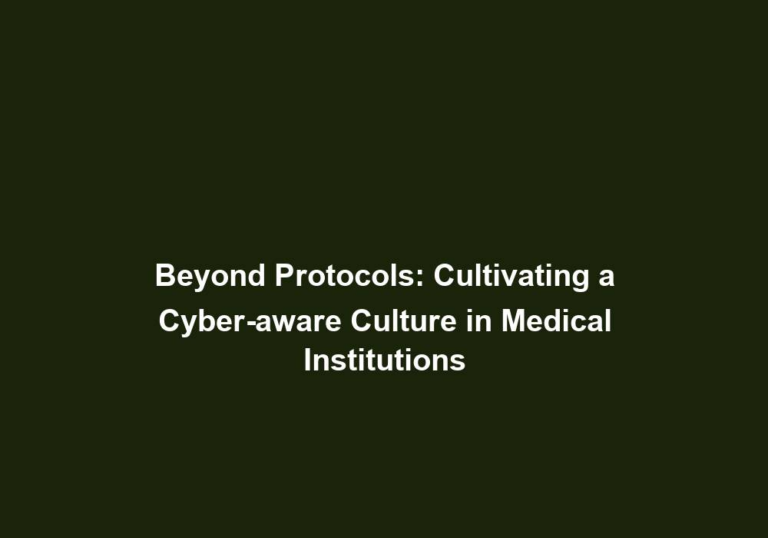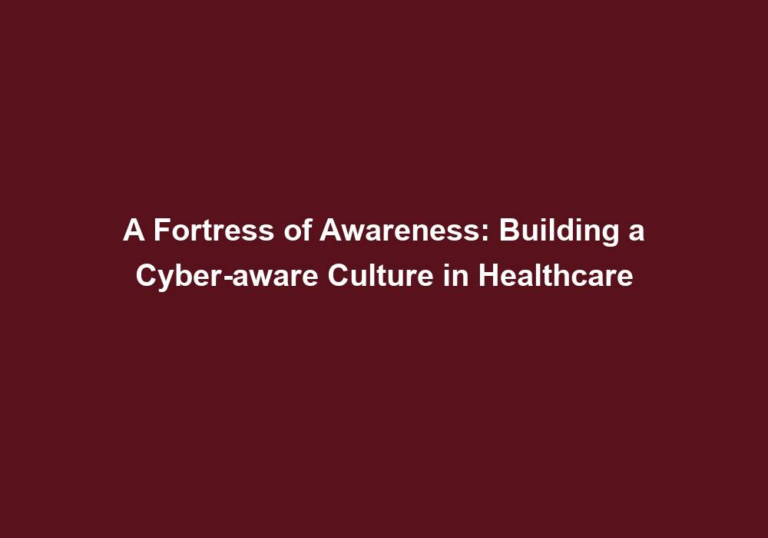Digital Bootcamp: Essential Cybersecurity Training for Healthcare Staff
In today’s technologically advanced world, where information is primarily stored and transmitted digitally, cybersecurity has become a critical concern for organizations in all sectors. The healthcare industry, in particular, holds a treasure trove of sensitive patient data, making it an attractive target for cybercriminals. Therefore, it is imperative for healthcare staff to undergo comprehensive cybersecurity training that equips them with the knowledge and skills to safeguard this vital information effectively.
The Growing Cybersecurity Threats in Healthcare
Healthcare organizations are increasingly falling victim to cyberattacks, resulting in data breaches, financial losses, and reputational damage. The reasons behind these attacks are numerous, including the value of medical data on the black market, the vulnerability of legacy systems, and the potential negative impact on patient care. To combat these threats effectively, healthcare staff must be well-prepared and have a solid understanding of cybersecurity best practices.
Cybersecurity threats in the healthcare industry are diverse and constantly evolving. Some of the common threats include:
-
Phishing Attacks: Cybercriminals often use deceptive emails, websites, or phone calls to trick healthcare staff into revealing sensitive information or downloading malicious software. By recognizing the signs of a phishing attack, healthcare staff can avoid falling victim to such scams.
-
Ransomware Attacks: Ransomware attacks involve encrypting an organization’s data and demanding a ransom for its release. Healthcare organizations are particularly vulnerable to these attacks due to the critical nature of patient data. By understanding the techniques used by ransomware attackers, healthcare staff can implement preventive measures to mitigate the risk.
-
Insider Threats: Healthcare staff with authorized access to sensitive information can pose a significant threat if they misuse or abuse their privileges. Proper training can help identify potential insider threats and establish protocols to minimize the risk.
To address these threats, comprehensive cybersecurity training for healthcare staff is crucial.
The Importance of Cybersecurity Training for Healthcare Staff
Investing in cybersecurity training for healthcare staff is essential for several reasons:
- Protecting Patient Data: Healthcare organizations are entrusted with highly sensitive patient information, including medical records, social security numbers, and financial details. By providing cybersecurity training, healthcare staff can learn to identify potential threats, prevent data breaches, and protect patient privacy.
Healthcare staff should be trained to understand the value of patient data and the potential consequences of a breach. They should be familiar with the types of data they handle, including electronic health records (EHRs), and the importance of implementing security measures to safeguard this information. Training should cover topics such as data encryption, secure file sharing practices, and the secure disposal of sensitive information.
- Preventing Ransomware Attacks: Ransomware attacks have become increasingly prevalent in the healthcare sector. These attacks involve encrypting an organization’s data and demanding a ransom for its release. With proper cybersecurity training, healthcare staff can recognize potential ransomware threats, implement preventive measures, and respond effectively in case of an attack.
Healthcare staff should be educated on the common signs of a ransomware attack, such as unexpected system slowdowns, unusual file extensions, or ransom notes. They should also be trained on the importance of regular data backups, network segmentation, and the use of robust antivirus and anti-malware solutions to mitigate the risk of ransomware attacks.
- Mitigating Legal and Financial Risks: Healthcare organizations are subject to strict data protection regulations, such as the Health Insurance Portability and Accountability Act (HIPAA). Failure to comply with these regulations can result in severe legal and financial penalties. By ensuring that healthcare staff are well-versed in cybersecurity best practices, organizations can minimize the risk of non-compliance and potential legal consequences.
Healthcare staff should be trained on the specific requirements of data protection regulations, including HIPAA. They should understand the importance of maintaining patient confidentiality, obtaining proper consent for data sharing, and implementing access controls to restrict unauthorized access to sensitive information. Training should also cover the reporting procedures for data breaches and the legal obligations of healthcare organizations in such cases.
Key Components of Cybersecurity Training for Healthcare Staff
To provide comprehensive cybersecurity training to healthcare staff, the following key components should be included:
1. Understanding the Cybersecurity Landscape
Healthcare staff must have a solid understanding of the current cybersecurity landscape, including the types of threats they may encounter and the potential impact of a cyberattack on patient care and organizational reputation. This knowledge will enable them to identify and respond to potential risks effectively.
Training on the cybersecurity landscape should cover topics such as the different types of cyber threats, including malware, social engineering attacks, and insider threats. Healthcare staff should also be educated on the potential consequences of a cyberattack, such as compromised patient care, financial losses, and damage to the organization’s reputation.
2. Recognizing Social Engineering Attacks
Social engineering attacks, such as phishing and pretexting, are common techniques used by cybercriminals to gain unauthorized access to sensitive information. Healthcare staff should be trained to recognize and report suspicious emails, phone calls, or requests for personal or login information.
Training on social engineering attacks should focus on educating healthcare staff about the common signs of such attacks, such as requests for sensitive information via email or phone calls from unknown sources. They should also be trained on the importance of verifying the identity of the sender or caller before sharing any information. Additionally, healthcare staff should be educated on the steps to take if they suspect they have fallen victim to a social engineering attack, such as reporting the incident to the IT department and changing passwords immediately.
3. Implementing Strong Password and Data Security Measures
Healthcare staff should be educated on the importance of creating strong, unique passwords and implementing multi-factor authentication for accessing sensitive systems. Additionally, they should be trained on data encryption, secure file sharing practices, and the importance of regularly updating software and systems to protect against vulnerabilities.
Training on password and data security measures should cover topics such as creating complex passwords, avoiding password reuse, and the use of password managers. Healthcare staff should also be educated on the importance of encrypting sensitive data, both in transit and at rest. Training should emphasize the need for regular software updates and patches to address known vulnerabilities and reduce the risk of exploitation by cybercriminals.
4. Cybersecurity Incident Response Training
Preparing healthcare staff for cybersecurity incidents is crucial to minimize the impact of an attack. Training should focus on identifying and reporting incidents promptly, containing the breach, and following the appropriate incident response protocols, such as contacting the IT department and reporting to the appropriate authorities.
Training on cybersecurity incident response should cover topics such as incident identification, containment, eradication, and recovery. Healthcare staff should be trained on the importance of reporting any suspicious activity or potential breaches immediately. They should also be educated on the steps to take to mitigate the impact of an incident, such as isolating affected systems, preserving evidence, and engaging with relevant internal and external stakeholders.
5. Regular Training and Simulation Exercises
Cybersecurity threats are constantly evolving, requiring healthcare staff to stay up-to-date with the latest techniques and preventive measures. Regular training sessions and simulation exercises, such as phishing drills, will help reinforce knowledge and ensure staff remain vigilant in detecting and preventing potential cyber threats.
Regular training and simulation exercises should be conducted to keep healthcare staff informed about the latest cybersecurity threats and mitigation strategies. Training should be interactive and engaging, providing hands-on experience with simulated cyberattacks. This approach will help healthcare staff develop the skills necessary to identify and respond to emerging threats effectively.
The Benefits of Digital Bootcamp for Healthcare Staff
Digital bootcamps offer an intensive and immersive training experience that can effectively equip healthcare staff with the necessary cybersecurity skills. Some of the key benefits of digital bootcamps include:
- Focused and Intensive Learning: Digital bootcamps provide a concentrated learning experience, allowing healthcare staff to acquire in-depth knowledge and skills in a shorter timeframe compared to traditional training methods.
Digital bootcamps offer a structured and focused curriculum that covers a wide range of cybersecurity topics relevant to the healthcare industry. The intensive nature of the training allows participants to immerse themselves in the subject matter, ensuring a comprehensive understanding of key concepts and best practices.
- Real-World Simulations: Digital bootcamps often incorporate real-world simulations and hands-on exercises, enabling healthcare staff to apply their newly acquired knowledge in a practical setting. This experience enhances their ability to respond effectively to cybersecurity threats.
Real-world simulations provide participants with the opportunity to practice their skills in a safe and controlled environment. By simulating various scenarios, healthcare staff can develop the critical thinking and problem-solving abilities necessary to address cybersecurity incidents confidently.
- Collaborative Learning Environment: Digital bootcamps facilitate collaboration and interaction among healthcare staff, promoting the exchange of ideas and experiences. This collaborative learning environment fosters a stronger understanding of cybersecurity principles and encourages a proactive mindset in protecting patient data.
Digital bootcamps often include group activities, discussions, and case studies that encourage participants to share their knowledge and experiences. This collaborative learning environment promotes a culture of continuous improvement and knowledge sharing within the healthcare organization.
Conclusion
As the healthcare industry continues to digitize its operations, the importance of cybersecurity training for healthcare staff cannot be overstated. By investing in comprehensive training programs, such as digital bootcamps, healthcare organizations can empower their staff to protect patient data, prevent cyberattacks, and mitigate legal and financial risks. With a well-equipped and knowledgeable workforce, the healthcare industry can continue to provide quality care while safeguarding patient privacy and data security.
“,10-Oct-23
Training and Awareness

